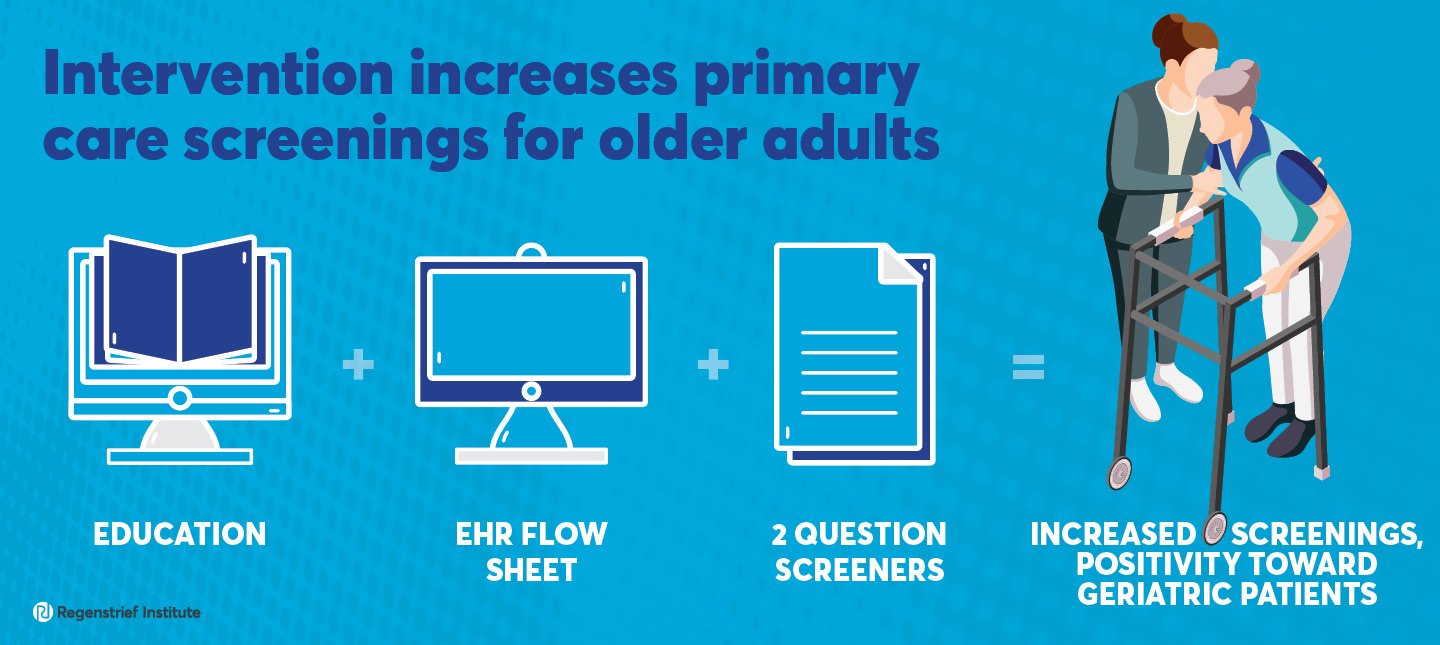Education-system solution designed to integrate geriatrics into primary care
Falls and dementia are some of the most common syndromes affecting the health of older adults, but many primary care physicians are not specifically trained to screen for them. The Indiana Geriatrics Education and Training Center (Indiana GETC) created a successful intervention combining education and workflow that increased primary care screenings for these geriatric conditions.
“There is a shortage of geriatrics specialists, so most older adults receive care from a primary care provider. That’s why it is so important to integrate geriatrics into primary care,” said lead study author Debra Litzelman, M.D., M.A., research scientist at Regenstrief Institute and the principal investigator and director of Indiana GETC. “We created an intervention that improves attitudes toward older adults and leverages teamwork to integrate these important screenings into care delivery. This study demonstrates that this intervention can be successfully implemented in primary care settings.”
The Indiana GETC delivered an interdisciplinary education course for primary care providers and staff including medical assistants, nurses, and social workers about older adults’ specific health concerns and screenings. They also created an electronic health record (EHR) flow sheet with screening questions that would be automatically triggered for office visits of patients 65 years or older. Each survey was only two questions and delivered by medical assistants as the patient was being taken to the exam room. Results were then communicated to the primary care provider.
The intervention was rolled out at eight Federally Qualified Health Centers in a health system in Indianapolis. More than 6,600 geriatric patients were cared for during the course of this study. Populations served were 51 percent Black and 33 percent Caucasian.
The study team found that after the education sessions, provider attitudes toward older patients and perceptions of the importance of a team approach to care became significantly more positive.
Screening rates also increased during training, and continuously increased afterward. This has happened at all sites for both dementia and falls surveys.
“The greater understanding of the needs of older adults provided by the education sessions likely primed the care teams to implement changes related to screenings,” said Dr. Litzelman. “The fact the screeners did not disrupt the patient flow was also a key to success. This intervention is actively being shared with other national Geriatrics Workforce Enhancement Programs.”
“Combined interprofessional education and system intervention to improve screening older adults for dementia and falls” is published in Gerontology & Geriatrics Education online ahead of print.
This project is supported by the Health Resources and Services Administration (HRSA) of the U.S.
Department of Health and Human Services (HHS) grant number U1QHP28719 for the Geriatrics Workforce Enhancement Program.
In addition to Dr. Litzelman, other authors are Sarah Roth MHA, MPH, of Regenstrief Institute and Dawn E. Butler, MSW, J.D.; Tochukwu Iloabuchi, M.D.; Kathryn I. Frank, PhD, R.N.; Na Bo, M.S.; Yan Tong; Emilie Garrison and Julie Vannerson, M.D., all of IU School of Medicine.
About Debra Litzelman, M.D., M.A.
Debra Litzelman, M.D., M.A., is a research scientist in the Regenstrief Institute William M. Tierney Center for Health Services Research. She is also the D. Craig Brater Professor of Global Health Education at Indiana University School of Medicine and the director of education for the Indiana University Center for Global Health.
About Regenstrief Institute
Founded in 1969 in Indianapolis, the Regenstrief Institute is a local, national and global leader dedicated to a world where better information empowers people to end disease and realize true health. A key research partner to Indiana University, Regenstrief and its research scientists are responsible for a growing number of major healthcare innovations and studies. Examples range from the development of global health information technology standards that enable the use and interoperability of electronic health records to improving patient-physician communications, to creating models of care that inform practice and improve the lives of patients around the globe.
Sam Regenstrief, a nationally successful entrepreneur from Connersville, Indiana, founded the institute with the goal of making healthcare more efficient and accessible for everyone. His vision continues to guide the institute’s research mission.
About IU School of Medicine
IU School of Medicine is the largest medical school in the U.S. and is annually ranked among the top medical schools in the nation by U.S. News & World Report. The school offers high-quality medical education, access to leading medical research and rich campus life in nine Indiana cities, including rural and urban locations consistently recognized for livability.










